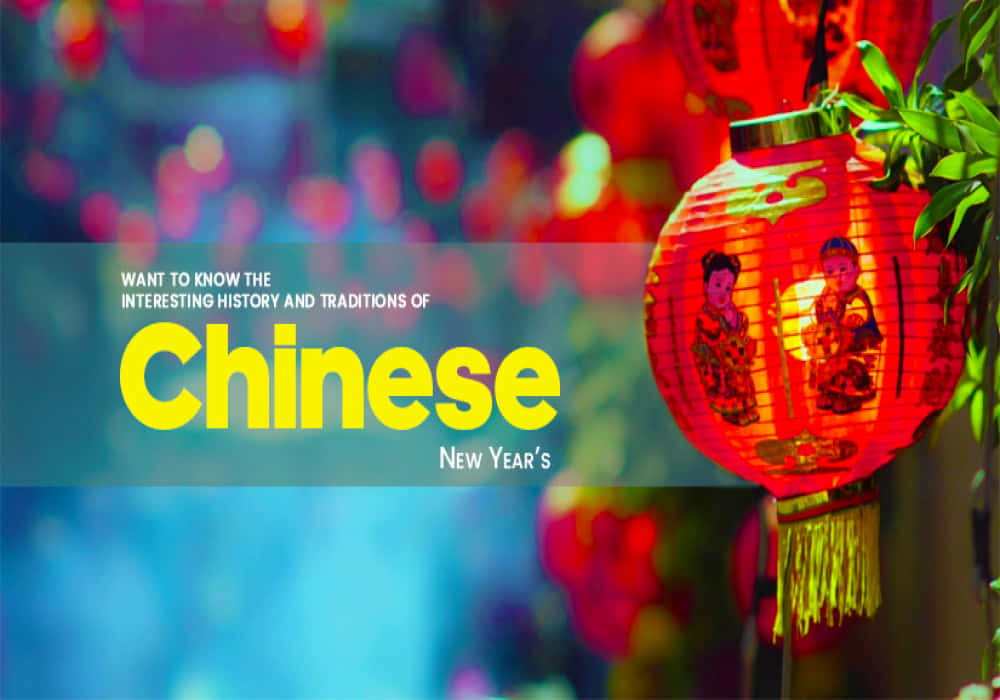
Last Updated At: 13-Dec-2023
Chinese New Year 2024: Know Significance, History and Traditions
Chinese New Year commonly referred to as the Spring Festival is an annual 15-day festival to celebrate New Year’s beginning.
This year, the Chinese New Year celebration will begin on 12th February, and it will last till 26th February. It is also called the Chinese Lunar New Year or Lunar New Year because the celebration dates are based on the lunisolar Chinese calendar. Hence the date for Chinese New Year changes every year.
Read on to explore Chinese New Year history.
History of Chinese New Year
The history of the Chinese New Year goes back to over 3500 years. According to the legends, the festival’s origin can be traced back to the Shang Dynasty (1600-1046 BC) when people worshipped Gods and ancestors at the beginning of the end of each year.
During the Western Zhou Dynasty (1046-256 BC), people made it a custom to begin agriculture on New Year celebrations. They offered sacrifices to ancestors or Gods and worshipped nature to bless harvests.
In the Han dynasty (202 BC – 220 AD), the first day of the first month in the Chinese lunar calendar was fixed as the festival’s date. Some of the rituals became popular, including ceremonial gathering and using fireworks in the form of burning bamboo to make a loud noise.
In the Wei and Jin dynasties (220-420), people indulged in entertaining activities apart from worshipping Gods and ancestors. The tradition of families getting together to have a reunion dinner, cleaning and decorating their house originated in this period.
In the Tang dynasty, the Chinese New Year celebration took a shift from worshipping and praying to social entertainment. People started displaying riddles on lanterns. They got public holidays for staying and celebrating with family members.
During the Song dynasty, firecrackers loaded with gunpowder came into the celebration. From Song to the Qing dynasty, the Chinese New Year celebration became more of social interaction. People began to meet friends and relatives, exchange gifts, and indulge in fun activities. The entertaining activities such as lion dance, dragon dance, and Shehuo performance started getting popular in this period.
In 1912, the government decided to eliminate the lunar calendar and Lunar New Year and implemented the Gregorian calendar instead. People were not willing to change the tradition; therefore, they kept both calendar systems and used the Gregorian calendar in schools and government organizations. After 1949, Chinese New Year was listed as a nationwide public holiday, and people started getting holidays at schools and workplaces.
Significance of Chinese New Year
Since its beginning, Chinese New Year has become popular in China and all across the globe that helps spread Chinese culture worldwide. It is also celebrated in countries like Indonesia, Singapore, Malaysia, Thailand, Myanmar, Mauritius, North America, and some parts of Europe. It is one of China's most important holidays that begins with New Year's Eve reunion dinner and continues till the next 15 days. Many rituals are performed to kick off the celebration and signify a new start. According to the Chinese lunar calendar, it indicates the beginning of Spring and a New Year.
This traditional festival allows people to get together with their families, celebrate and spend quality time together. The festival is said to bring good fortune for the coming year. Earlier, the celebration was meant for farmers and workers to have some time off from hard labor and resume work after a period of rest. Chinese people use Chinese Zodiac animals to represent each Chinese New Year. 2021 is the year of the Ox.
According to a myth about the beast ‘Nian,’ people burn firecrackers at midnight on Chinese New Year’s Eve to drive away bad luck and evil monsters. In the morning, burning firecrackers is considered a gesture to welcome the New Year and attract good luck.
Traditions of Chinese New Year
People follow many customs and traditions during the 15-day Chinese New Year festival:
- People clean the wall, ground, and corner of their house to drive the old things and negative energy away and get ready for a new start
- On Chinese New Year, people prefer everything new for the festival. The elders buy new clothes for all family members. Everyone in the family wears brand new clothes on New Year’s Day
- It is considered the best time to head home, catch up with friends and family, and plan a reunion dinner
The red envelopes, also known as lucky money, is given to children by the elder members of the family after the reunion dinner
- Eating dumplings made with flour and stuffed with different fillings is a custom of the Chinese New Year, which is believed to bring wealth in the coming year
- During the Chinese New Year, people paste “Fu” upside down on their gates that symbolizes the arrival of happiness or good fortune
- In Chinese culture, the red color is associated with wealth and good fortune. The bright red decorations are hung to ward off a lion-like monster
- The Spring Festival couplets are pasted on doorways as a part of the festival’s decoration
- The glutinous rice balls also called Yuanxiao or Tangyuan in Chinese are a traditional food for the Chinese New Year. They are made of sticky rice flour stuffed with different fillings
- The Chinese lanterns are lit throughout the streets, and poems and riddles are written on them for entertainment
You can plan a solo or family trip to China during the Chinese New Year to experience the true spirit of the festival. Consult Adotrip for an affordable tour package to China. With our online route planner's help, you can check out the list of destinations and transport facilities along with accommodation options across China.
--- Published By Adotrip
Latest Blogs

17 Best Places for 2 Days Trip from Delhi

Top 10 Hill Stations Near Bangalore for an Unforgettable Get...

Top 10 Hill Stations Near Chennai For a Perfect Getaway

10 Best Hill Station Getaways Near Gurgaon for Peace Seekers

10 Astonishing Underwater Temples of India You Must Visit in...
Speak to our experts
Popular Flights
Nagpur to Udaipur Flights
Coimbatore to Goa Flights
Pune to Udaipur Flights
Coimbatore to Varanasi Flights
Udaipur to Ahmedabad Flights
Jammu to Nagpur Flights
Mangalore to Pune Flights
Pune to Amritsar Flights
Jammu to Thiruvananthapuram Flights
Indore to Kochi Flights

 Dubai
Dubai Malaysia
Malaysia USA
USA






